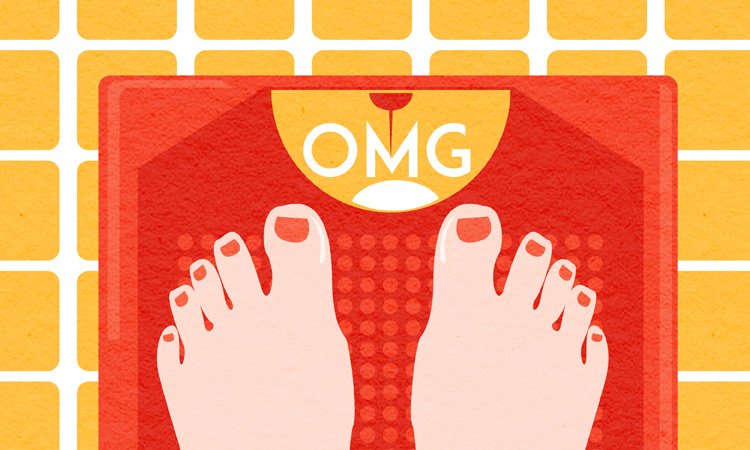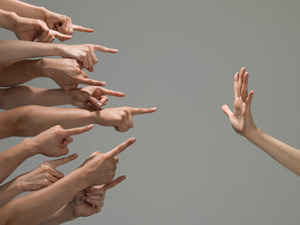 “Fat shaming is not a thing. Fat people made that up. That’s a race card with no race,” says comedian Nicole Arbour during a hypercritical rant titled, Dear Fat People, on YouTube. You may have heard about it by now, or even seen it. It’s gained over nine million views on the site, and sparked outrage along with a national conversation.
“Fat shaming is not a thing. Fat people made that up. That’s a race card with no race,” says comedian Nicole Arbour during a hypercritical rant titled, Dear Fat People, on YouTube. You may have heard about it by now, or even seen it. It’s gained over nine million views on the site, and sparked outrage along with a national conversation.
But fat shaming is a thing. And it’s not a positive thing, such as providing helpful advice on how to change a relationship with food, or how to get lean or how to start a healthy lifestyle. It seems that for those in the pro fat shaming camp, it’s all about trying to get someone to lose weight through ridiculing and shaming them.
“If we offend you so much that you lose weight, I’m OK with that,” Arbour says.
But many people aren’t. Shameful? Hurtful? Unfair? Yes, times three. I don’t think fat shaming’s okay, and neither do many others.
A culture of perfection and blame
In the U.S., two-thirds of adults, and one-half of children are overweight or obese, reports The Rudd Center for Food Policy and Obesity at Yale University (TRC). At a rapidly growing pace, TRC adds, weight bias is affecting millions.
TRC explains, “Weight bias exists because of beliefs that: stigma and shame will motivate people to go on diets and lose weight” and from beliefs that “the only reason people fail to lose weight is because of poor self-discipline or a lack of willpower.”
It doesn’t help either, that we live in a society so focused on how we look. Just pick up any tabloid to find paparazzi photos and unforgiving comments aimed at celebrities who have put on some pounds.
 “People are fat shaming because we’ve been bombarded by the media that it is desirable to be thin. Somehow we have all gotten unrealistic notions of what looks acceptable,” says Brad Davidson, a co-founder and performance strategist at StarkFitness, and author of The Stark Naked 21-Day Metabolic Reset. “What we should be worried about is health and fitness, and not weight! Celebrities get fat shamed all the time, especially since people can hide behind the Internet.”
“People are fat shaming because we’ve been bombarded by the media that it is desirable to be thin. Somehow we have all gotten unrealistic notions of what looks acceptable,” says Brad Davidson, a co-founder and performance strategist at StarkFitness, and author of The Stark Naked 21-Day Metabolic Reset. “What we should be worried about is health and fitness, and not weight! Celebrities get fat shamed all the time, especially since people can hide behind the Internet.”
Fat shaming: FAIL
Eric Robinson, a behavioral scientist at The University of Liverpool, notes that “At present, the evidence points very clearly in one direction: fat shaming or making people feel bad about their weight does not motivate successful weight loss or promote healthy changes to a person’s lifestyle. In fact, it does quite the opposite.” He adds that “Multiple research studies have also shown that experiencing fat shaming or being treated poorly because of your weight is not conducive to weight loss” and has adverse outcomes for those targeted, which can lead to increased overeating.
“Weight bias can have a significant impact on social, economic, and physical health. Social and economic consequences include social rejection, poor quality of relationships, worse academic outcomes, and lower socio-economic status,” explains TRC.
TRC’s research also indicates, “Health consequences can include behaviors such as binge eating, unhealthy weight control practices, coping with stigma by eating more, refusing to diet, and avoiding physical activity. Weight bias can also lead to higher blood pressure, more stress, and an overall poor quality of life.”
The damaging effects of discrimination
 TRC stresses that overweight people face a host of discrimination in society—, including in school, the workplace and even from the medical profession.
TRC stresses that overweight people face a host of discrimination in society—, including in school, the workplace and even from the medical profession.
In the classroom, weight bias can affect academic opportunities and achievement. TRC reports, “Teachers have lower expectations for overweight students (compared to thinner students) across a range of ability areas.”
On the job, TRC indicates, “Overweight people earn 1 to 6 percent less than non-overweight people in comparable positions, and obese females suffer more than obese males.” People who are overweight also receive fewer promotions. “Overweight people are viewed as lazy, less competent, and lacking in self-discipline by their employers and co-workers.” According to TRC, they are at risk for being fired or suspended due to their weight, despite good job performance. This is true even if the quality of being overweight is unrelated to their job responsibilities.
Overweight people may be denied medical services because of their weight and are at risk to become the target of derogatory comments and jokes by doctors, nurses, nutritionists, and other health professionals. TRC notes, “In one study of nurses, 31 percent said they would prefer not to care for obese patients.” Even in the mental health care profession, “Psychologists ascribe more pathology, more negative and severe symptoms, and worse prognosis to obese patients compared to thinner patients presenting identical psychological profiles.”
When you’re the target
But what do you do when you or someone you know is targeted? “The best response is to ignore those comments,” Davidson says, adding, “If someone verbally fat shames you, then an appropriate reply is: ‘Your comments are not helpful–and not kind.’”
Sounds like good advice. And we all know the world could certainly use more kindness. Isn’t it time to stick it to meanness and discrimination? The real shame would be to do nothing.

Rose Caiola
Inspired. Rewired.

